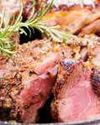
Any connoisseur of Mughlai food must have savoured the succulent kebabs, which come in wide varieties, shapes and tastes. But in general, all kebabs are simply sumptuous. Though the word kebab may be of Persian in origin, but its taste has influenced the lovers of good food the world over. However, kebabs are not only an integral part of the Mughlai dishes from India. They have their presence in Persian, Arabic, Turkish, Central Asian, and even African cuisines.
Even people in many European countries enjoy this wonderful meat dish, whose taste has withstood the test of time. Kebabs in general constitute grilled or broiled meats of goat, chicken, lamb, and bovine creatures, etc. In the Muslim and Jewish world, the intake of pork is prohibited by religion, but pork kebabs are not that uncommon in Albania, Bulgaria, Cyprus, Georgia, Greece, and the United Kingdom. Even in Goa, pork kebabs are being enjoyed.
Misty History
The history of kebab, like many other world-class delicacies, is wrapped in the foils of mystery. According to the Arabic tradition, kebab is believed to be invented in medieval Iran, where soldiers used to grill meat on their swords, by holding them over field fires. However, this claim is disputed by many who state that kebab was originated in the East Mediterranean region, during ancient times, a region which includes the modern nation-states of Greece, Lebanon, Syria, Jordon, Cyprus, Israel, the territories of the West Bank, and the Gaza Strip.
This story is from the June - July 2021 edition of Food & Beverage Business Review.
Start your 7-day Magzter GOLD free trial to access thousands of curated premium stories, and 9,000+ magazines and newspapers.
Already a subscriber ? Sign In
This story is from the June - July 2021 edition of Food & Beverage Business Review.
Start your 7-day Magzter GOLD free trial to access thousands of curated premium stories, and 9,000+ magazines and newspapers.
Already a subscriber? Sign In

California Walnut Crop Mid-Harvest Update
Fall is here, and the California Walnut Commission has provided a mid-harvest update on the 2024 walnut crop.

Consumer Trust in Dietary Supplements Demands Third-Party Certification, Reveals NSF 2024 Report
NSF, a leading public health and safety organization, published its 2024 Supplement Safety Consumer Benchmark report earlier his year, aimed at evaluating consumer preferences and safety concerns regarding dietary supplements.

India Bakery Exhibition 2024: A Grand Success at Chennai Trade Center
The India Bakery Exhibition 2024, held from 20th to 22nd September at the Chennai Trade Center, proved to be a resounding success.

Strong Aromas of Blue Cheese
There is no way you can forget your first view, first smell and first taste of any Blue Cheese.

Debunking Cancer Nutrition Myths
Good nutrition is especially important during the treatment of cancer as it helps to tolerate chemotherapy, radiation and surgery better.

Of the Sheep
The features of a goat’s and that of a sheep’s meat are almost similar and are not readily identifiable.

Indian Ethnic Flavors: A New Wave in Beverage Trends
As the world of beverages continues to evolve, a powerful new trend is emerging, reshaping the landscape of drinks with bold, authentic, and distinctly Indian flavors.

Cloves - Strong & Zesty!
Cloves are flower buds harvested before they flower and their tree belongs to an evergreen variety, aptly named as the clove tree, a part of the Myrtle plant family.

World Chefs Congress
New Congress, Old Gold

Tech Takes Over F&B Industry
Technology impacts every facet of our lives. It is reshaping every industry. Artificial Intelligence (Al) and robotics have had transformative impacts on all industries, including the food & beverage sector. Driven by advancements in robotics and Al, routine and repetitive tasks are automated to increase productivity and, thus, enhance profitability. Ashok Malkani examines the effects of technology and robotics on the restaurant industry in India.